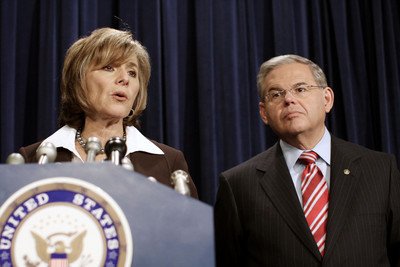House OKs housing aid bill
WASHINGTON -- The House last week responded to the nation's mortgage crisis by passing a package of bills that aims to rescue homeowners facing foreclosure while stimulating real estate markets.
Supporters called it a far-reaching effort to help families. Critics including officials in the White House said elements amounted to a costly bailout for lenders and speculators who took risks in an overheated housing economy and lost.
The centerpiece bill passed 266-154. Thirty-nine Republicans from states hard hit by foreclosures joined 227 Democrats in voting for the bill, defying a White House veto threat.
Congressional action was spurred by the collapse of the market in risky subprime mortgages. As banks have toughened lending standards and housing prices have fallen, millions of homeowners are falling behind on payments but can't refinance because they owe more than their homes are worth.
Among the rescue strategies, the package expands Federal Housing Administration loan programs by $300 billion to help borrowers and lenders refinance properties into more affordable fixed-rate mortgages.
It also raises the cap on mortgages the FHA could ensure, from $362,790 to $729,750 or 125 percent of the median home price in a market, whichever is less.
To help sell vacant properties, it would provide a no-interest 15-year loan of $7,500 for first-time homebuyers, along with a one-time $350 tax deduction.
Reps. Dean Heller and Jon Porter, both R-Nev., and Rep. Shelley Berkley, D-Nev., voted for the bill.
A related bill that passed 239-188 provides $15 billion in loans and grants for states to rehabilitate foreclosed properties.
Supporters said the bill would help move foreclosed homes. Critics said the biggest beneficiaries would be private lenders, and not homeowners.
Berkley and Porter voted for the bill. Heller voted against it.
AVIATION BILL COLLAPSES
Efforts to pass a broad airport policy bill collapsed in a partisan dispute over provisions unrelated to aviation.
The Senate failed to limit debate on the bill that would reauthorize the workings of the Federal Aviation Administration through 2011.
The key vote was 49-42 to end debate, but 60 votes were needed. With that, Democratic leaders said the bill was dead for the year.
The bill would have freed up millions of dollars in grants for local airport improvements and set up a framework to pay for a modernized air traffic control system.
Republicans objected to several parts of the bill they argued were questionable and extraneous, including $1.7 billion in infrastructure bonds for New York City.
Democrats said it was the final installment of $20 billion in aid that President Bush promised New York after the Sept. 11, 2001, attacks.
Republicans also opposed provisions that would have increased taxes on oil spills by 5 cents per barrel, using the revenues to replenish the Highway Trust Fund.
Republicans offered to pass the bill without those provisions but talks went nowhere.
Sens. John Ensign, R-Nev., voted not to cut off debate on the bill. Senate Majority Leader Harry Reid, D-Nev., favored moving forward on the bill, but he voted against it in a procedural move that preserved his ability to revive it at a later date.
WIND INSURANCE REJECTED
Senators from Gulf Coast states tried but failed to add wind coverage to the federal flood insurance program.
The Senate rejected an amendment by Sen. Roger Wicker, R-Miss., to allow property holders in the hurricane-prone region to obtain federal wind protection.
Coastal homeowners and insurance companies engaged in epic disputes following hurricanes Katrina and Rita in 2005. Companies refused to pay a number of claims, arguing that damages were caused by wind, and not necessarily by flooding, and so would not be compensated.
Wicker said the insurance premiums for federal coverage would be based on risk, so the program would essentially pay for itself. But other senators questioned whether the potential costs really could be determined.
Insurance companies opposed the amendment, saying it would undermine their businesses. The Bush administration agreed, saying it would be "financially irresponsible" for the government to take on the liability from the private sector.
Wicker's amendment was defeated, 19-74. Ensign and Reid voted against it.

















